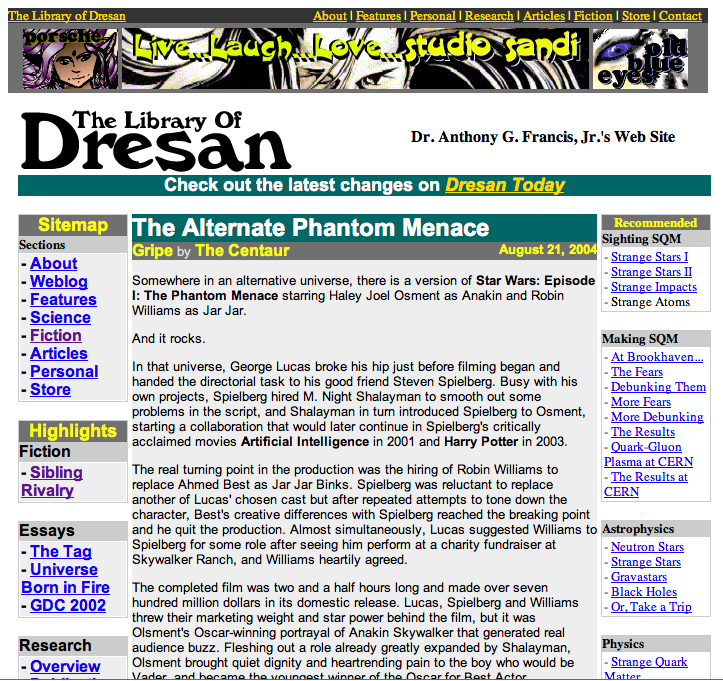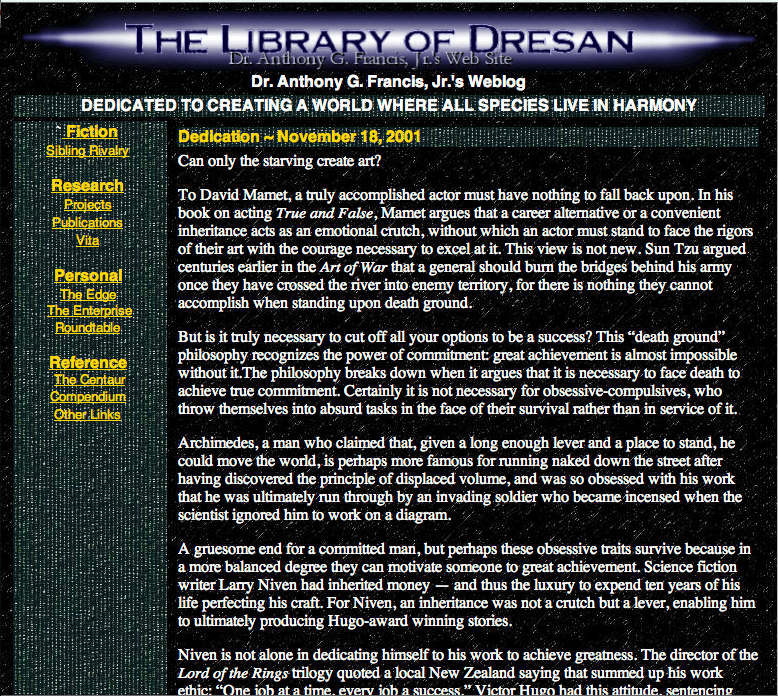Loosely transcribed from a letter to a friend. Names have been variablized to protect the innocent:
Dude, it's been over a year since you applied at The Search Engine That Starts With a G and since then you've created, all by yourself, a brand new, polished web site with no doubt N users and X,Y and Z impressive features. Time to update the resume and apply again?
I know you're frustrated that this venture didn't make it, but successful entrepreneurs are ones that try, try and try again. During my time at The Search Engine That Started With an E, we were exposed to a variety of advisors who had started successful businesses. Most of these had started several, only a few of which caught off. The ones that did made them millionaires. My uncle B is the same way: he's worked on many businesses; many failed, the others did quite well. Come to think of it, when the dot-com bubble burst, the lead founder of The Search Engine That Started With an E didn't let its stumble stop him - he's started several other ventures since then. One of them will catch fire and make him a millionaire too.
I also had another thought. Stay with me here. In the essay The Myth of Sisyphus, Albert Camus argues that just because the Greek hero Sisyphus is condemned for eternity to push a rock up a hill, only to watch it roll down again, that doesn't mean that his life is actually devoid of hope. Camus argues that even though Sisyphus's task is meaningless, and the moment the rock falls down is heartwrenching, he nonetheless can be happy because he's engaged in a constant struggle ... "and that struggle is enough to fill a man's heart." In the book How to Be an Existentialist, author Gary Cox expands on Camus' argument: to an existentialist, everyone's life can be considered to be meaningless, and it's the constant struggle to exercise our freedom itself that brings meaning to life. In other words, the struggle has intrinsic value, just to us, whether we succeed or not.
But I am not an existentialist, and in the objective world we share, our tasks do not endlessly repeat. It does look like we live in a world where the rock will always roll back down - time and entropy conquer all - but sometimes the rocks stay at the top of the hill, a long, long time. Longer than the allotted time we have to push rocks up the hill, sometimes; sometimes the rock stays up, even when we're the ones that slip and fall away. It is, in short, possible to succeed. It's possible to build something that lasts ... but what if we don't?
Well, even if we don't, I am still not an existentialist, and in the objective world we share, our burdens are not unique to ourselves. There are many other people pushing rocks, and it brings comfort to know others are struggling. There are many other hills - sometimes, they even look like the same hill - and it can ease other's paths to know which parts of the slope are better. That is, not only does the struggle have intrinsic value, above and beyond the possibility of leading to a reward, our reports about the struggle also has extrinsic value, value to others who are fighting the same struggle ourselves. Keeping our struggle to ourselves is noble; sharing it with others is valuable. Perhaps, even, something that could lead to a reward.
What if ... I know it is too late for this for the work you did over the last year, but imagine ... what if you had a blog, and every week blogged about your experience finding and overcoming development / product / business challenges for Company X? Yes, I know there are millions of blogs, and yes, I know most of them are drek. But they're not what I'm talking about: I'm talking about your blog, your experiences, your wisdom. Imagine, if you'd been doing that from the ground up, talking about your experiences, passing on your wisdom, it might start to build a name that you could turn into a career. At the very least, it would be another point of reference for your resume.
Seriously, I've learned from you about how to use technology X to design web sites and benefited from development platform Y that you pointed out to me. And I've been doing this for years. If I could learn from you, don't you think other people could to?
Everything you're doing might be a building block in the next big thing. I know it's trite to say that many great companies have started in garages ... but how much copy has been written sharing those stories? How much have you benefited from learning how others have done things? How much can other people learn from you?
How big can you think?
-the Centaur
Alright, enough blogging, time to get back to "real" work. Let me leave you with a teaser, the scene I'm working on right now - the Stanford Department of Alchemy, from LIQUID FIRE:


“Magicians have survived by being secretive,” Devenger said, folding his arms sternly. “You, I can find out anything I want on Wikipedia, including pictures of your tattoos good enough to reverse-engineer some of their logic—” “Wait, back up. I have a Wikipedia page?” I said, laughing. “Bullshit.” Devenger’s salt-and-pepper eyebrows lifted. “And I thought you were web savvy. Haven’t you ever Googled yourself?” And with that he turned to the screen, tapped out my name, and ten seconds later had found a Wikipedia page on Dakota Caroline Frost, complete with that same old out-of-date picture everyone scarfed from the Rogue Unicorn web site. “Damn,” I said, leaning over his shoulder. “That’s me all right—” “Down to a list of your tattoos,” Devenger said, scrolling down through the page. “Even ones you no longer have, like your original Dragon tattoo—” “Wait,” I said. “ Scroll back up. There, my daughter’s name. Why is that a link?” “Maybe she has a Wikipedia page too,” he said. Something cold ran up my spine. "Click on it," I said quietly.Why is Dakota so worried? Until 2011, when LIQUID FIRE comes out: wonder. -the Centaur
Way back in the dawn of time, the Library of Dresan looked very different.
 And I didn't just write all the articles ... I formatted all the HTML by hand.
Now, thank goodness, publishing to my blog is easier than I ever imagined, back in the day (and no, I'm not going to snark about Blogger having as many problems then as now, it served me well for many years before it, well, finally stopped serving me well).
SO ANYWAY, I'm reblogging all of the old articles of the Library, tagged now as, um, Reblogging. I will of course leave the original Articles up for historical interest and my eternal embarrassment. I mean, adding banner ads to my own site ... pointing to my own site! What was I thinking?
Really, next I'll get so self-referential I'll be critiquing myself as I'm writing this!
-the Centaur
And I didn't just write all the articles ... I formatted all the HTML by hand.
Now, thank goodness, publishing to my blog is easier than I ever imagined, back in the day (and no, I'm not going to snark about Blogger having as many problems then as now, it served me well for many years before it, well, finally stopped serving me well).
SO ANYWAY, I'm reblogging all of the old articles of the Library, tagged now as, um, Reblogging. I will of course leave the original Articles up for historical interest and my eternal embarrassment. I mean, adding banner ads to my own site ... pointing to my own site! What was I thinking?
Really, next I'll get so self-referential I'll be critiquing myself as I'm writing this!
-the Centaur
 And I didn't just write all the articles ... I formatted all the HTML by hand.
Now, thank goodness, publishing to my blog is easier than I ever imagined, back in the day (and no, I'm not going to snark about Blogger having as many problems then as now, it served me well for many years before it, well, finally stopped serving me well).
SO ANYWAY, I'm reblogging all of the old articles of the Library, tagged now as, um, Reblogging. I will of course leave the original Articles up for historical interest and my eternal embarrassment. I mean, adding banner ads to my own site ... pointing to my own site! What was I thinking?
Really, next I'll get so self-referential I'll be critiquing myself as I'm writing this!
-the Centaur
And I didn't just write all the articles ... I formatted all the HTML by hand.
Now, thank goodness, publishing to my blog is easier than I ever imagined, back in the day (and no, I'm not going to snark about Blogger having as many problems then as now, it served me well for many years before it, well, finally stopped serving me well).
SO ANYWAY, I'm reblogging all of the old articles of the Library, tagged now as, um, Reblogging. I will of course leave the original Articles up for historical interest and my eternal embarrassment. I mean, adding banner ads to my own site ... pointing to my own site! What was I thinking?
Really, next I'll get so self-referential I'll be critiquing myself as I'm writing this!
-the Centaur
No, not the WABAC machine ... the Wayback Machine! As clever as Mr. Peabody's invention is, what we're talking about here is the Internet Archive's tool for looking at what the Web looked like long ago. It's located at www.archive.org and is a great tool for inspecting, for example, how your own web sites have evolved.
Let's take a look at what the Library of Dresan looked like, long long ago. Set the Wayback Machine to December 3, 2001, Sherman! (If you're following along at home, you might want to play the theme music for Jeopardy while the page loads ... this may take a while, the Internet Archive is stored on stone tablets). Alright, so the page looked like this:
 *shudder*
In case you don't "get" the many problems with this version of the site, let me point out (beyond the background which makes it nearly unreadable) that the site is "dedicated" to something (universal peace and harmony) different from what it was actually dedicated to (my random thoughts and musings) and then with that in mind I went and wrote a post called "Dedication" which appears right under that dedication? Need I go on?
Well, we can't expect perfection right off the bat, can we? (Or ever. Shut up, voice of reason! I'm just sayin'. Shut up!) At least I haven't done something dumb like, I dunno, making my site logo with Papyrus. That would be just too embarrassing for words.
-the Centaur
*shudder*
In case you don't "get" the many problems with this version of the site, let me point out (beyond the background which makes it nearly unreadable) that the site is "dedicated" to something (universal peace and harmony) different from what it was actually dedicated to (my random thoughts and musings) and then with that in mind I went and wrote a post called "Dedication" which appears right under that dedication? Need I go on?
Well, we can't expect perfection right off the bat, can we? (Or ever. Shut up, voice of reason! I'm just sayin'. Shut up!) At least I haven't done something dumb like, I dunno, making my site logo with Papyrus. That would be just too embarrassing for words.
-the Centaur
 *shudder*
In case you don't "get" the many problems with this version of the site, let me point out (beyond the background which makes it nearly unreadable) that the site is "dedicated" to something (universal peace and harmony) different from what it was actually dedicated to (my random thoughts and musings) and then with that in mind I went and wrote a post called "Dedication" which appears right under that dedication? Need I go on?
Well, we can't expect perfection right off the bat, can we? (Or ever. Shut up, voice of reason! I'm just sayin'. Shut up!) At least I haven't done something dumb like, I dunno, making my site logo with Papyrus. That would be just too embarrassing for words.
-the Centaur
*shudder*
In case you don't "get" the many problems with this version of the site, let me point out (beyond the background which makes it nearly unreadable) that the site is "dedicated" to something (universal peace and harmony) different from what it was actually dedicated to (my random thoughts and musings) and then with that in mind I went and wrote a post called "Dedication" which appears right under that dedication? Need I go on?
Well, we can't expect perfection right off the bat, can we? (Or ever. Shut up, voice of reason! I'm just sayin'. Shut up!) At least I haven't done something dumb like, I dunno, making my site logo with Papyrus. That would be just too embarrassing for words.
-the Centaur
Found while researching the next Dakota Frost trilogy...
http://englishrussia.com/index.php/2008/03/25/darvaz-the-door-to-hell/See also http://en.wikipedia.org/wiki/Derweze#The_.22Door_to_Hell.22. While I did find it researching Skindancer Books 4 through 6, this this specific site will probably not appear until somewhere around book 20 or 21. (Yes, I'm planning at least 21 books, though I have less on paper for things past Book 6 than Lucas had for Star Wars 9 (and yes, I know Lucas now denies there were plans for Star Wars 9, but what does he know, he also thinks Greedo shot first ... or does he? :-) )).This place in Uzbekistan is called by locals “The Door to Hell”. It is situated near the small town of Darvaz. The story of this place lasts already for 35 years. Once the geologists were drilling for gas. Then suddenly during the drilling they have found an underground cavern, it was so big that all the drilling site with all the equipment and camps got deep deep under the ground. None dared to go down there because the cavern was filled with gas. So they ignited it so that no poisonous gas could come out of the hole, and since then, it’s burning, already for 35 years without any pause. Nobody knows how many tons of excellent gas has been burned for all those years but it just seems to be infinite there.
When I was visiting England over the Fourth of July many, many years ago, a British radio announcer interviewed visiting Americans to ask what the Fourth of July celebrated. I missed the interview, but the host at the bed and breakfast I was staying in at Drumnadrochit by Loch Ness asked me the next morning. I'm embarrassed to say it took me about thirty seconds to say ... "the signing of the Declaration of Independence". As it turns out, I did far better than the average tourist.
Well, uh, umpteen years later, things aren't any better ... even in our homeland. From Jay Leno's 4th of July episode of Jaywalking:
As a friend said, scary stuff.
I was sitting on my porch while my wife was rooting succulents and when she heard the video play she said "uh uh!" and ran over to watch. I think we got all of the questions except the Minutemen, and our "guess" (that they were an elite group of colonial soldiers who were our first line of defense against the British, essentially Revolutionary War special forces) was apparently spot on.
Afterwards, all we had to say was: "Go Grandpa!"
-the Centaur
http://www.foxnews.com/leisure/2010/07/06/worlds-fastest-car-crowned-mph/
The 0-62 mph sprint still takes about 2.5 seconds but 0-124 mph comes up in just 7.3 seconds and 186 mph passes in just 15 seconds. However, the number everyone wants to know is how fast will it go? Bugatti and its test driver Pierre-Henri Raphanel have already taken care of this, posting top speeds of 265.9 mph and 269.8 mph in a Guinness world record attempt. The final number for the record books was 268 mph, a figure that even hit Bugatti's engineering team by surprise.If there was a straight shot lane from here to work, this car could do it in 6 minutes. My normal commute is closer to 50. -the Centaur UPDATE: A friend pointed out that at top speed the car would run out of gas in 13 minutes. That's there and back to work, right? Surely, a friend asked, one tank for a round trip to work ... that's green enough, right? Anthony can handle that guilt, no? Uh ... no. For the record, my Prius gets approximately 48 miles per gallon, with the average often approaching 50. That's closer to 20 trips to and from work. Much more green for my taste, and much less green out of my wallet. Of course, if I had $1.8 million to drop on a car, my fuel prices would be the last of my worries. That having been said, a $1.8 million would buy me a house in Mountain View with a solar roof and a Tesla, so this Bugatti STILL wouldn't be my next car.
... leaving only 2083 messages in my "1. Active" pile and 460 in my "5. Blog It!" pile.
Sigh.
Expect a large number of stale, no-longer topical posts over the next six months as I reduce the above numbers to something manageable.
-the Centaur
I'm a big free speech advocate, and I'm strongly against most well-intentioned attempts to protect us from ourselves - or, more cynically, to protect some people from people whose preferences are different - so this is worth mentioning.
The Independent Game Developer's Association is filing an amicus brief in the court battle over California's attempt to ban the sale of violent video games to minors. Details on the case are here:
http://www.scotusblog.com/2010/04/court-to-rule-on-violent-videos/ The Supreme Court agreed Monday to rule on the constitutionality of a state law banning the sale or rental of violent video games to minors. The Court accepted for review an appeal by the state of California, urging the Court to adopt a new constitutional standard that would enable states to ban such games for those under age 18. The case is Schwarzenegger v. Video Software Dealers Association (08-1448). The Court apparently had been holding the case until it decided another First Amendment case involving violent expression — U.S. v. Stevens (08-769). In that ruling, issued last Tuesday, the Court struck down a federal law that banned the depiction in videotapes of animal cruelty. In that ruling, the Justices refused to create a new exception to the First Amendment free speech right. The Court could have opted to send the California case back to the Ninth Circuit Court to weigh the impact of the Stevens decision. Instead, it simply granted review; the case will be heard and decided in the Court’s next Term, starting Oct. 4.From IGDA's call to action:
The IGDA in partnership with the AIAS, is working with the ESA to put together an AMICUS brief to support the decision to revoke this ban and declare this law unconstitutional. With the concept that video/computer/electronic games are a new form of media and art form, our industry should be afforded the freedom of speech protections that have been fought for and won by print, audio and video groups from newspapers to rap artists to filmmakers across the country. We need your help in securing powerful arguments that explain how this industry has evolved into a true profession over the years, and a medium that touches children and adults around the world every day.So, if you care about your rights to buy videogames, or about giving government yet another tool to control what we see and hear, you might consider weighing in - if not on this court case, if to your elected representatives asking them what on Earth they were thinking in the first place. -Anthony
Warren Ellis's comic Red is being made into a movie, and a friend of mine commented how reasonable Warren Ellis seems to be about adaptation (as opposed to, say, Alan Moore, who is of course entitled to his own opinion). From Warren Ellis's blog:
http://www.warrenellis.com/?p=8099 The tone: no, the film isn’t as grim as the book. The book is pretty grim. But it’s also pretty small. When I sell the rights to a book, they buy the right to adapt it in whatever way they see fit. I can accept that they wanted a lighter film, and, as I’ve said before, the script is very enjoyable and tight as a drum. They haven’t adapted it badly, by any means. People who’ve enjoyed the graphic novel will have to accept that it’s an adaptation and that by definition means that it’s going to be a different beast from the book. The film has the same DNA. It retains bits that are very clearly from the book, as well as, of course, the overall plotline. But it is, yes, lighter, and funnier. And if anyone has a real problem with that, I say to you once again: Helen Mirren with a sniper rifle. I mean, if you don’t want to see a film with Helen Mirren with a sniper rifle, I’m not sure I want to know you.Amen to that. -the Centaur
Issue 5 of Coilhouse, the magazine that claims to be a "love letter to alternative culture" but is actually the cheapest legal way to blow your mind without abusing prescription medications, is out now, with as usual mindblowing imagery:
Inside you'll find everything from Neil Gaiman to Sherlock Holmes and the Fox Women:
In addition to being a very neat and disturbing magazine, Coilhouse is the home of Frost Moon's first print advertisment (other than the ones arranged for by Bell Bridge Books).
Check it out!
-the Centaur
 So I'm a fan of the highly obscure but highly funny comic "Bear and Fox" - with cute characters, a wry sense of humor, and a nerd factor of approximately 9.0 on the Geek Hierarchy scale, it's right up my alley. Well, Randall Christopher, the creator of Bear and Fox, is at it again, and is looking from some help kickstarting the project!
So I'm a fan of the highly obscure but highly funny comic "Bear and Fox" - with cute characters, a wry sense of humor, and a nerd factor of approximately 9.0 on the Geek Hierarchy scale, it's right up my alley. Well, Randall Christopher, the creator of Bear and Fox, is at it again, and is looking from some help kickstarting the project!
 |
Hi everyone, The first two pages of the new Bear and Fox comic book are posted online! I am still trying to raise the funds to get the comic book printed. I've raised a little over a third of the amount needed with three days left to go. Thanks to all who have pledged so far! If the funds are not raised by midnight monday, the project will go unfunded and no one will be charged. The new comics! http://www.bearandfox.com Where to pledge: http://www.kickstarter.com ps. if anyone wants to help me out by blogging this, stumbling it, diggin it, facebooking, friendstering, etc by all means, yes |
 UPDATE: The Kickstart was successful! Here's to Bear and Fox 2!
UPDATE: The Kickstart was successful! Here's to Bear and Fox 2!
Avoid the cloud, the device. Eats my posts and notes, they do.
-the centaur
UPDATE: Now that I have a keyboard, here's the story. I'm reading Twilight as an audiobook, and wanted to do a quick "story so far" review. (In 11 words with punctuation: Twilight isn't bad - it's delightfully concrete - but I'm not it's demographic.) That's short, so I thought I'd try a quick review while I was leaving the campus of The Search Engine That Starts With A G.
But the voice recognition got HILARIOUSLY bad. It was actually comical, like the phone was fighting my review of Twilight - at one point the phone confessed that it WAS Twilight. Go figure. Finally I got to the car, sat down, and in the quiet tried to finish the review - and lost the connection to the voice recognition server. Sighing, I started to type the last line - and then the screen went kazoo, the app went away, and the phone returned to the home screen. Frantically, I returned to the app.
Every. Word. Gone.
Now, that's in part the fault of the WordPress Android app; it should have saved intermediate versions, like the WordPress web interface is doing every few minutes or so right now. But this isn't limited to the WordPress app; it's happened to me on other apps, in particular a note taking program. And in this case, I blame Android; from what happened to the screen and my experience with the software, I'm almost certain it was something in the main Android OS and not in the app itself that caused the app to go away (with the caveat that, again, it was the app's responsibility to save versions.)
So: pfui on you, as Nero Wolfe might say. I'm still going to stick to Android, as I can in theory write my own app with its own save behavior and not have to give somebody a stevejob just to get it accepted into the App Store. (Note: the iPhone is a high quality piece of hardware and I no more dispute Steve's right to mess it up with weird conditions than he disputes my right to use a buggier phone).
...if this was a real post, I'd say something substantive, like that I suspect if the top post has an image in it, it can cause the header to move up and be covered by the banner image, which is wrong. Stay tuned...
-the Centaur
UPDATE: No and yes. If a post has a WordPress-style image in it, it can chomp its own header, regardless of whether it is the first post. Got a little bit of debugging to do...
UPDATED UPDATE: Teh problem wasn't that the image had a theme error, the problem was the post had no title. Easily fixed: add a title, OR update the theme to write "This Post Title Unintentionally Left Blank" in the box... :-)
UPDATED UPDATE POSTSCRIPT: And I award Chrome's Developer Tools (themselves based on the WebKit Inspector) the prize for helping me find this bug by giving me an easy way to navigate down to that element and see that it wasn't just squeezed out (which had happened in an earlier iteration of the theme I'd tested locally on my laptop via MAMP) but was indeed missing its content. Hm. Another fix for hte bug would be to set a minimum height on the div for the title of the post ... interesting ...
 More Frost Moon news ... the Amazon $0.99 promotion (in turn, caused by the iPad $0.99 promotion) is having good effects:
More Frost Moon news ... the Amazon $0.99 promotion (in turn, caused by the iPad $0.99 promotion) is having good effects:
http://ireaderreview.com/2010/07/01/some-interesting-friday-kindle-book-deals/ There are lots of good kindle book deals doing well on the charts today ... 7.Frost Moon by Anthony Francis has made its way into the Top 100. It’s rated 4.5 stars on 30 reviews and is just $1.It's almost like my hard working publisher's efforts to promote my book are, uh, working. Yaay Bell Bridge Books! -the CentaurIn an alternate Atlanta where magic is practiced openly, where witches sip coffee at local cafes, shapeshifters party at urban clubs, vampires rule the southern night like gangsters, and mysterious creatures command dark caverns beneath the city, Dakota Frost’s talents are coveted by all. She’s the best magical tattooist in the southeast, a Skindancer, able to bring her amazing tats to life. When a serial killer begins stalking Atlanta’s tattooed elite, the police and the Feds seek Dakota’s help. Can she find the killer on the dark fringe of the city’s Edgeworld?Quite a collection of deals.
Almost easy enough to do when taking a walk.
Easier to use voice input.
Almost. It didn't successfully read the previous sentence (or this one) but it was close.
- the centaur
Clipped by a friend:
Amazon Bestsellers Rank: #58 Paid in Kindle Store (See Top 100 Paid in Kindle Store)Wow. I'm flabbergastled. Rest assured, though, Blood Rock is at the publisher and Skindancer:Liquid Fire and Spellpunk:Hex Code are underway! -the Centaur
#22 in Kindle Store > Kindle Books > Fiction > Contemporary Fiction #3 in Kindle Store > Kindle Books > Fantasy #4 in Books > Science Fiction & Fantasy > Fantasy
Actually it was quite an adventure just getting this far, for which I've taken notes that I plan to blog. But I thought I should make the following points:
- Yes, I know a number of widgets on the site are broken.
- Yes, I know a number of parts of the theme are messed up.
- Yes, I know there are parts of the theme that are messed up, that I don't yet know are messed up. :-(
...same bat domain, different bat fully qualified URL, different bat RSS feed. The Library of Dresan blog is now at http://www.dresan.com/index.php (actually, http://www.dresan.com/ should work). Please update your RSS feeds to: http://www.dresan.com/?feed=atom ...
-the Centaur
BWAH HA HAHAAHAA!
Posting to the blog is LIIIIVE again.
And for those that don't get it, "The Dawning of Val Mar" is a private in joke that about 3 people on Earth will get ... that was originally the "first post" on my WordPress blog before I had to delete it.
The post is gone, but the in joke lives on. Massive flurry of posts to follow, God willing. Peace out.
-teh Centaur


